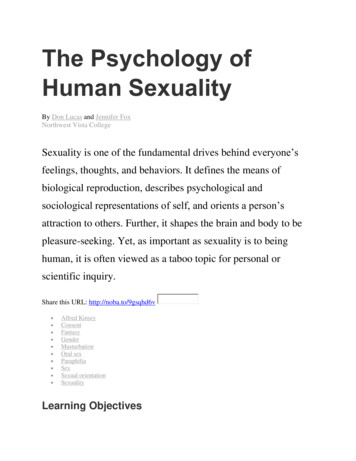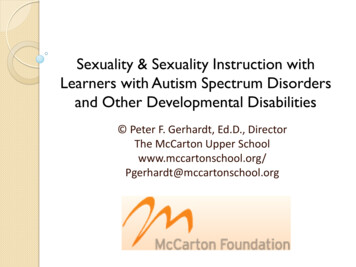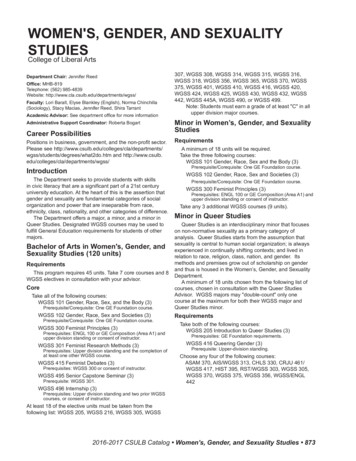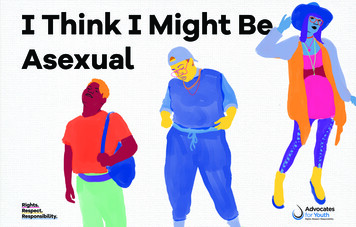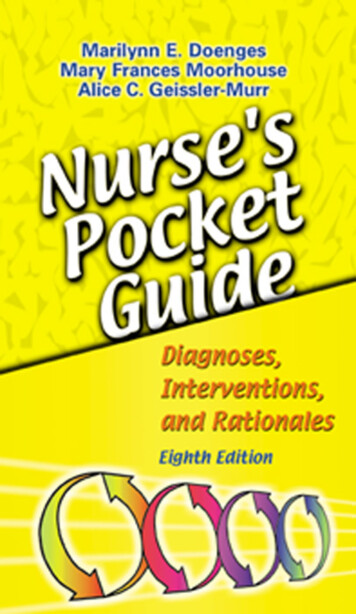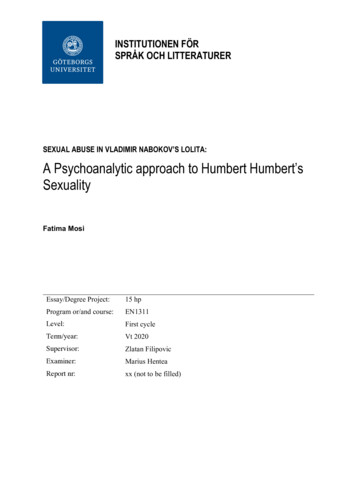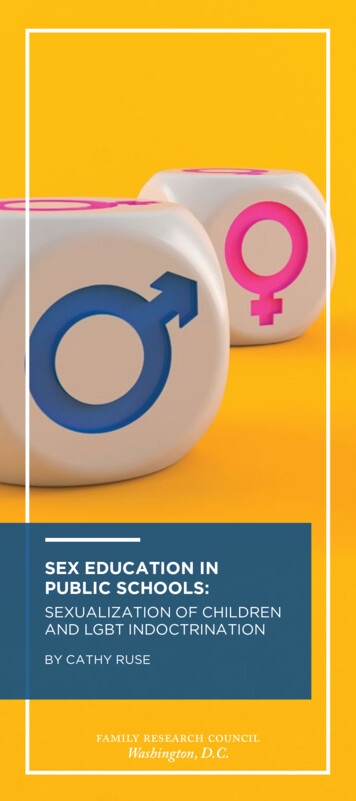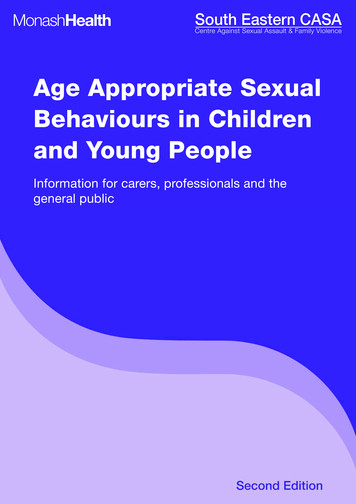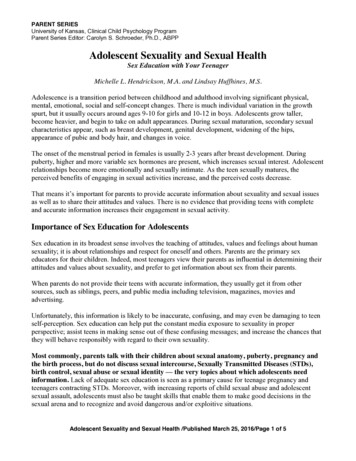
Transcription
PARENT SERIESUniversity of Kansas, Clinical Child Psychology ProgramParent Series Editor: Carolyn S. Schroeder, Ph.D., ABPPAdolescent Sexuality and Sexual HealthSex Education with Your TeenagerMichelle L. Hendrickson, M.A. and Lindsay Huffhines, M.S.Adolescence is a transition period between childhood and adulthood involving significant physical,mental, emotional, social and self-concept changes. There is much individual variation in the growthspurt, but it usually occurs around ages 9-10 for girls and 10-12 in boys. Adolescents grow taller,become heavier, and begin to take on adult appearances. During sexual maturation, secondary sexualcharacteristics appear, such as breast development, genital development, widening of the hips,appearance of pubic and body hair, and changes in voice.The onset of the menstrual period in females is usually 2-3 years after breast development. Duringpuberty, higher and more variable sex hormones are present, which increases sexual interest. Adolescentrelationships become more emotionally and sexually intimate. As the teen sexually matures, theperceived benefits of engaging in sexual activities increase, and the perceived costs decrease.That means it’s important for parents to provide accurate information about sexuality and sexual issuesas well as to share their attitudes and values. There is no evidence that providing teens with completeand accurate information increases their engagement in sexual activity.Importance of Sex Education for AdolescentsSex education in its broadest sense involves the teaching of attitudes, values and feelings about humansexuality; it is about relationships and respect for oneself and others. Parents are the primary sexeducators for their children. Indeed, most teenagers view their parents as influential in determining theirattitudes and values about sexuality, and prefer to get information about sex from their parents.When parents do not provide their teens with accurate information, they usually get it from othersources, such as siblings, peers, and public media including television, magazines, movies andadvertising.Unfortunately, this information is likely to be inaccurate, confusing, and may even be damaging to teenself-perception. Sex education can help put the constant media exposure to sexuality in properperspective; assist teens in making sense out of these confusing messages; and increase the chances thatthey will behave responsibly with regard to their own sexuality.Most commonly, parents talk with their children about sexual anatomy, puberty, pregnancy andthe birth process, but do not discuss sexual intercourse, Sexually Transmitted Diseases (STDs),birth control, sexual abuse or sexual identity — the very topics about which adolescents needinformation. Lack of adequate sex education is seen as a primary cause for teenage pregnancy andteenagers contracting STDs. Moreover, with increasing reports of child sexual abuse and adolescentsexual assault, adolescents must also be taught skills that enable them to make good decisions in thesexual arena and to recognize and avoid dangerous and/or exploitive situations.Adolescent Sexuality and Sexual Health /Published March 25, 2016/Page 1 of 5
Tips for Sexual Education with TeenagersTeenagers need information on safe sex, body image, sexual identity and relationships. Givingcomplete and accurate information can challengeeven the most informed parent. Buying or borrowing aresource book for yourself and your adolescent is an excellent practice. Books provide platforms fordiscussion of sensitive topics, and let you revisit certain topics throughout this developmental period.Several such books are listed in the “Resources” section at the end of this handout.Depending on you and your teen’s level of comfort, you can look at these resources together; let yourteen read them on his or her own; or simply leave the books in an accessible place in your home.When we talk about sexuality we are not just talking about what we DO as sexual beings but alsowho we ARE. Sexuality is expressed in our relationships with each other, how we view ourselves andhow we are able to express friendship, love and pleasure. Every person’s self-image is inseparably tiedto their sex and sexual identity. Tell your teen that sexual identity is an important part of who he or sheis, meaning that it is not something to be hidden or lied about.When we talk about sexuality, we are talking about ONE aspect of ourselves. It is important toremember that sexuality is part of us, but does not define who we are. Sexuality is an important partof your teen’s identity. However, just like being tall, having brown hair, or a good singing voice,sexuality is just one aspect of who your teen is. No one aspect defines us. This can be an especiallyimportant message for LGBTQ youth.Giving factual information about sexual health and safety to your teenager is important and canstill be done according to your value system. Knowing facts about STDs, prevention of pregnancy,sexual orientation, gender identity, and prevention of sexual assault will help keep teens healthier andsafer. Before speaking with your child about sexuality, think about what your values are. What do youbelieve? What does your faith tradition say? It is important to give your children factual information —and to be specific about how your beliefs either agree with, or differ from science.You can be an important role model for your teen. Young people often find it confusing whenparents talk about a value regarding sexuality, and then act in a way that does not support that value.Common values about sexuality and relationships that most people support include honesty, equality,responsibility and respect for differences. Acting on your values and being a good role model arepowerful messages for your children.Talking about sex should be a conversation, not a lecture. Instead of talking at your teen, find outwhat he or she thinks and feels about sexuality and relationships. Ask open-ended questions that begin“How do you feel about .,” for example). Then you can share information and respond to questions inways that resonate with the belief system your teens are developing for themselves.The majority of teenagers have their first sexual experience in high school. Surveys indicate thatfewer than two percent of adolescents have sex by their 12th birthday. However, 16 percent have sex byage 15; 33 percent at age 16; 48 percent have sex by age 17; as do 61 percent of 18 year olds and 71percent of 19 year olds. There is little difference between males and females in the timing of first sex.These statistics provide evidence that parents should talk to their children about sex sooner ratherthan later. Too often, parents think they need to wait until they collect enough information and energyto be prepared to have “THE TALK” with their adolescents. However, sexuality is a part of everyAdolescent Sexuality and Sexual Health /Published March 25, 2016/Page 2 of 5
person's life from the moment he or she is born. It’s important, to start the conversation early, and tomake it clear to your adolescent that you are always willing to talk about sexuality whenever questionsarise for them, or when a “teachable moment” occurs.Facts about sexual safety should always be included in the conversation. The safest way to preventpregnancy and sexually transmitted diseases is abstinence. That means not having vaginal, anal or oralsex. Teaching abstinence exclusively, however, does not stop most teenagers from engaging in sexualactivity or being victims of rape.Admit that talking about sex may be awkward. Remember to keep your sense of humor throughoutconversations with your adolescent. The conversation doesn't have to be tense and uncomfortable unlessyou make it that way.Adolescents may make some mistakes involving sex, and will need nonjudgmental guidance andsupport from parents to get through these rough times. If your adolescent makes a poor decisionregarding sexual behavior, try not to panic. This is common and can be used as a teaching moment,hopefully guiding the teen toward better choices in the future. Often teens make mistakes because ofmisinformation or peer pressure. The books listed at the end of this handout can help provide teens withinformation to help them feel empowered to make good decisions about their sexual health andbehavior.Adolescents are sensitive to messages from parents that communicate shame about the body,sexual identity, or gender identity. Parents can reinforce the message that adolescents are valuable,loveable people. Let your teen know you are interested in his or her thoughts and feelings about anytopic, whether it’s sexuality, school, religion or the future. Praise your teen for sharing feelings withyou. Correct misinformation gently. Praise teens for living their values.Finding out your teen is sexually activeWhether your adolescent discloses sexual activity to you, or you find out by accident — findingcondoms in his or her room, for instance — the way you react can make a huge difference. Adolescentscommonly worry about how their parents will react. Some may feel embarrassed, and others just aren’tsure how to talk about it. Remember that adolescents ultimately make their own decisions about theirsex lives, but parents can help guide them to make good decisions about their sexual health andrelationships.First, it is important to be as loving and supportive as possible. The best thing that you can do islisten and try to stay open, no matter how you feel about what your teen tells you. Remember thatadolescents who have positive and supportive relationships with their parents have fewer sex partners,use condoms more consistently, and take fewer risks than teens who lack parental support.Reassure your adolescent that you do not think about him or her any differently now that youknow about the sexual activity. It can help to express your unconditional love and support.Try to avoid lecturing or asking too many questions. This can make your adolescent shut down. Tryalternating active listening with general questions about sexual health such as “What are you doing forprotection and birth control?”, and the relationship — “Do you feel good about yourself when you’rewith him/her?”Adolescent Sexuality and Sexual Health /Published March 25, 2016/Page 3 of 5
If you find your adolescent is engaging in risky sexual behaviors such as unprotected sex, not usingcondoms consistently, or not using birth control, use it as an opportunity to teach good sexual health.Offer to take your teen to a health center for an STD screen, help identify places offering freecondoms, and look into options for birth control together.End the initial conversation when the adolescent is unable or unwilling to talk. Pressuring teens to talkmakes it less likely they’ll seek your advice in the future. Check-in regularly about your adolescent’ssexual health and relationships during relaxed times, not just when there is an issue or conflict.Do’s and Don’tsDoGive your adolescent comprehensive sex education — talk about STDs, pregnancy prevention,and how to have healthy, respectful and consensual sexual relationships.Buy or borrow good sexuality education books for yourself and your adolescent.Talk about your values and the facts of sex education.Begin the conversation early, and check-in often with your adolescent.Practice active listening when your teen expresses opinions and ideas about sex andrelationships.Don’tRely on abstinence-only sex education, or assume your adolescent will abstain from sexualbehaviors.Wait to give “THE TALK.”Lecture your teen.Panic if your teen’s sexual behaviors or values are different from your own.ResourcesBooks for ParentsHow to Talk with Teens about Love, Relationships, and S-E-X. Amy G. Miron and Charles D. Miron.Free Spirit Publishing, 2001.This easy-to-understand book contains real life examples; and covers a wide range of topics, from howto initiate a conversation, to sexual development and sexual orientation. Different lifestyles, beliefs andmorals are taken into consideration.Why Do They Act That Way?: A Survival Guide to the Adolescent Brain for You and Your Teen. Dr.David Walsh. Atria Books, 2005.In Why Do They Act Way?, the authors explain in understandable terms scientific findings about thedevelopment of the brain, puberty, moodiness, risk-taking, miscommunication, fatigue and othercommon teenage behavior problems. The book provides real-life examples and sample dialogues toteach parents how to communicate with their adolescents about numerous issues.Books for AdolescentsBoy’s Guide to Becoming a Teen and Girl’s Guide to Becoming a Teen. The American MedicalAssociation, 2006.Adolescent Sexuality and Sexual Health /Published March 25, 2016/Page 4 of 5
These books cover a range of topics to help boys and girls understand the physical and emotionalchanges that they will experience during puberty. The book offers information about reproductivesystem development, nutrition, skin care and relationships.Sex: A Book for Teens: An Uncensored Guide to Your Body, Sex, and Safety. Nikol Hasle. Zest Books,2010.This humorous yet straightforward book helps teens understand different forms of sex, masturbation,sexual orientation and gender identity, along with body issues, relationships, birth control, andprotection against diseases.S.E.X.: The All-You-Need-To-Know Progressive Sexuality Guide to Get You Through High School andCollege. Heather Corinna. Da Capo Press, 2007.The authors provide information on reproductive anatomy, dealing with puberty, birth control,relationships, sexual activities and STD prevention.Adolescent Sexuality and Sexual Health /Published March 25, 2016/Page 5 of 5
x Give your adolescent comprehensive sex education — talk about STDs, pregnancy prevention, and how to have healthy, respectful and consensual sexual relationships. x Buy or borrow good sexuality education books for yourself and your adolescent. x Talk about you
